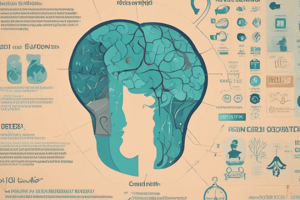Podcast
Questions and Answers
What is defined by nonessential body fat, and what is the range for an individual to be considered obese?
What is defined by nonessential body fat, and what is the range for an individual to be considered obese?
Obesity is defined by having an excess of nonessential body fat and is considered obese if an individual’s body mass index is 30 or greater.
What is the definition of mental health?
What is the definition of mental health?
Mental health represents the capacity to think, feel, and behave in ways that contribute to the ability to enjoy life and manage challenges.
Match the stages of wellness with their descriptions:
Match the stages of wellness with their descriptions:
Physical wellness = Includes not just your body’s overall condition but also your fitness level and ability to care for yourself. Emotional wellness = Reflects your ability to understand and deal with your feelings. Intellectual wellness = Constantly challenging the mind and an active mind is essential to wellness because it detects problems, finds solutions, and directs behavior. Interpersonal wellness = Defined by your ability to develop and maintain satisfying and supportive relationships, requires participating in and contributing to your community and society. Spiritual wellness = Possesses a set of beliefs, principles, or values that give meaning and purpose to your life, especially in difficult times. Environmental wellness = Defined by the livability of your surroundings, you can learn about and protect yourself from hazards Cultural wellness = Acquired patterns of behavior through daily interactions with families, communities, and society Occupational wellness = Refers to the level of happiness and fulfillment you gain through your work Financial wellness = A person’s economic situation is a key factor in overall well-being.
The term "social exclusion" means that individuals or groups who are denied the opportunity to fully involve themselves in Canadian life are more likely to have access to social and economic resources.
The term "social exclusion" means that individuals or groups who are denied the opportunity to fully involve themselves in Canadian life are more likely to have access to social and economic resources.
Flashcards
Health
Health
The overall condition of a person's body or mind, encompassing the presence or absence of illness or injury. It is influenced by both controllable and uncontrollable factors.
Wellness
Wellness
A state of optimal health and vitality, characterized by living life to its fullest. It is primarily determined by the conscious choices we make about how we live.
Social Determinants of Health
Social Determinants of Health
Factors that contribute to a person's overall health beyond individual choices, including income, education, employment, and access to healthcare.
Subcutaneous Fat
Subcutaneous Fat
Signup and view all the flashcards
Visceral Fat
Visceral Fat
Signup and view all the flashcards
Ectopic Fat
Ectopic Fat
Signup and view all the flashcards
Obesity
Obesity
Signup and view all the flashcards
Energy Balance
Energy Balance
Signup and view all the flashcards
Body Mass Index (BMI)
Body Mass Index (BMI)
Signup and view all the flashcards
Sex
Sex
Signup and view all the flashcards
Gender
Gender
Signup and view all the flashcards
Defence Mechanism
Defence Mechanism
Signup and view all the flashcards
Cognitive Distortions
Cognitive Distortions
Signup and view all the flashcards
Anxiety
Anxiety
Signup and view all the flashcards
Generalized Anxiety Disorder (GAD)
Generalized Anxiety Disorder (GAD)
Signup and view all the flashcards
Obsessive-Compulsive Disorder (OCD)
Obsessive-Compulsive Disorder (OCD)
Signup and view all the flashcards
Panic Disorder
Panic Disorder
Signup and view all the flashcards
Bipolar Disorder
Bipolar Disorder
Signup and view all the flashcards
Depression
Depression
Signup and view all the flashcards
Eustress
Eustress
Signup and view all the flashcards
Distress
Distress
Signup and view all the flashcards
Burnout
Burnout
Signup and view all the flashcards
General Adaptation Syndrome (GAS)
General Adaptation Syndrome (GAS)
Signup and view all the flashcards
Allostatic Load
Allostatic Load
Signup and view all the flashcards
Psychoneuroimmunology
Psychoneuroimmunology
Signup and view all the flashcards
Resilience
Resilience
Signup and view all the flashcards
Values
Values
Signup and view all the flashcards
Self-Concept
Self-Concept
Signup and view all the flashcards
Self-Esteem
Self-Esteem
Signup and view all the flashcards
Assertiveness
Assertiveness
Signup and view all the flashcards
Major Depressive Disorder
Major Depressive Disorder
Signup and view all the flashcards
Agoraphobia
Agoraphobia
Signup and view all the flashcards
Signup and view all the flashcards
Study Notes
General Statistics
- 14% of Canadians aged 15+ have some level of disability.
- One-third of Canadian seniors have a disability.
- 1 in 5 Canadians live in rural areas (fewer than 1,000 residents and <400 people/km²).
- Daily Suicide Attempts: ~275 Canadians attempt suicide daily.
- Daily Suicide Deaths: 11 Canadians die by suicide daily (2022).
- 8.7% of Canadians (15+) experience GAD.
- 1% diagnosed with obsessions, compulsions, or both (OCD).
- ~10% of people have experienced PTSD at some point.
- 11% of Canadians (15+) experience depression in their lifetime.
- 14.1% of women vs 8.5% of men experience depression.
- 1% current prevalence of Schizophrenia.
- 3% lifetime risk of Schizophrenia.
- 56% men vs 44% women experience Schizophrenia.
- 30% of schizophrenia cases begin between ages 20-34.
- 46-76% experience tension headaches.
- 8.3% diagnosed with migraines.
- 36% of Indigenous people abstain from alcohol, compared to 18% of general population.
- 25% of Indigenous people reported binge drinking.
- 30% of all cancer deaths are attributable to tobacco.
- 350,000 Canadians affected by body dysmorphic disorder (BDD).
- 54% of adults with obesity report stigma from coworkers.
- 72% images in media stigmatize people with obesity.
Specific Mental Health Statistics
- Phobias:
- 5% of children.
- 16% of adolescents.
- 13% of all Canadians experience a specific phobia.
- Social Phobia:
- 8-13% of Canadians fear humiliation/embarrassment when observed.
- Panic Disorder:
- 2% experience it annually.
- 4% experience it in their lifetime.
- Generalized Anxiety Disorder (GAD): -8.7% of Canadians (15+) experience GAD.
Studying That Suits You
Use AI to generate personalized quizzes and flashcards to suit your learning preferences.





